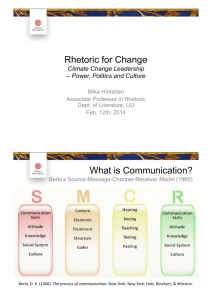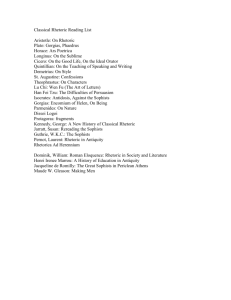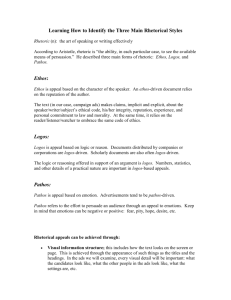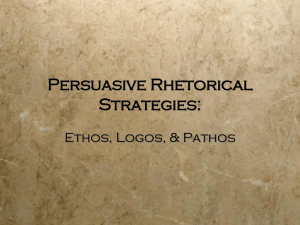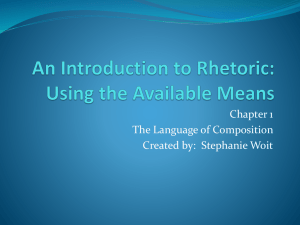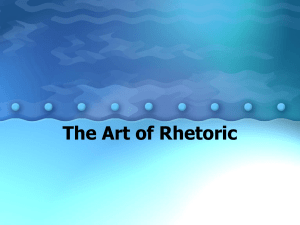Rhetoric Classical
advertisement
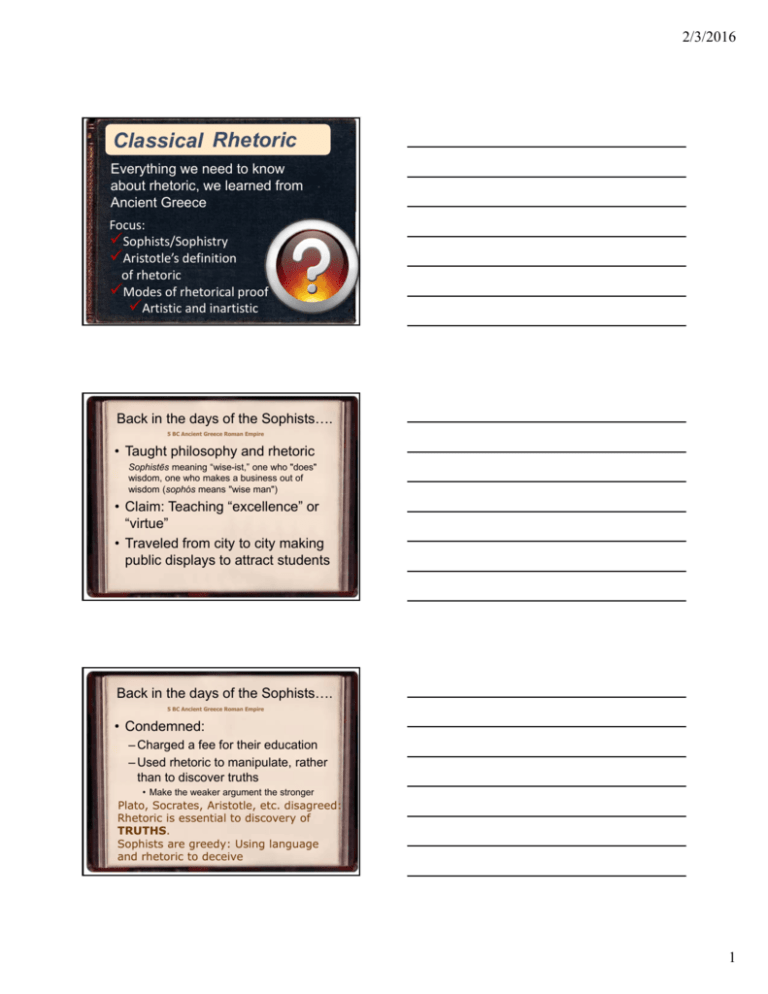
2/3/2016 Classical Rhetoric Everything we need to know about rhetoric, we learned from Ancient Greece Focus: Sophists/Sophistry Aristotle’s definition of rhetoric Modes of rhetorical proof Artistic and inartistic Back in the days of the Sophists…. 5 BC Ancient Greece Roman Empire • Taught philosophy and rhetoric Sophistēs meaning “wise-ist,” one who "does" wisdom, one who makes a business out of wisdom (sophós means "wise man") • Claim: Teaching “excellence” or “virtue” • Traveled from city to city making public displays to attract students Back in the days of the Sophists…. 5 BC Ancient Greece Roman Empire • Condemned: – Charged a fee for their education – Used rhetoric to manipulate, rather than to discover truths • Make the weaker argument the stronger Plato, Socrates, Aristotle, etc. disagreed: Rhetoric is essential to discovery of TRUTHS. Sophists are greedy: Using language and rhetoric to deceive 1 2/3/2016 Back in the days of the Sophists…. 5 BC Ancient Greece Roman Empire • Condemned: – Charged a fee for their education – Used rhetoric to manipulate, rather than to discover truths • Make the weaker argument the stronger • Sophistry – negative connotation “Rhetoric is the art of ruling the minds —Plato of men.” soph·ist·ry [sof-uh-stree] noun, plural soph·ist·ries 1. a subtle, tricky, superficially plausible, but generally fallacious method of reasoning. 2. a false argument; sophism. “Abuse of words has been the great instrument of sophistry and chicanery, of party, faction, and division of society.” –John Adams Dictionary.com Rhetoric… … is a human art or skill Aristotle sez… Rhetoric: “The faculty of observing in any given case the available means of persuasion.” 2 2/3/2016 How do you PROVE something? Every speech must contain both Artistic proofs Inartistic proofs things which the things that exist speaker creates in (are “there”): the audience Facts, statistics, Ethos Inventio Pathos Dispositio Logos Elocutio Memoria Actio oaths, documents, contracts, constitutions, etc. Artistic proofs ethos - personal appeals pathos - emotional appeals logos - logical appeals Inartistic proofs Laws Contracts Witnesses Tortures Oaths Statistical surveys Experiments Government documents Photographs Artistic proofs ethos pathos logos "The US Census has been reporting for some time that fifty percent of all marriages will end in divorce." "Turn and look at the person sitting next to you. One of the two of you will likely get a divorce." "Because one out of every two marriages here in the United States ends in divorce, it is imperative we reform the court system to be fair to both men AND women." “One out of every two marriages ends in divorce.” “The U.S. Census reports that half of all marriages end in divorce. That means that one out of every two marriages are not successful. It could be yours; it could be the person's sitting next to you. And, if you are a woman, your chances of a fair settlement are far lower than if you are a man. Therefore, we must reform our court system.“ 3 2/3/2016 The Rhetorical Triangle ethos logos pathos Ethos A demonstration of the speaker’s: Intelligence Integrity Goodwill How Ethos is communicated Intrinsic contained in the speech text (what is said during the speech to convince the audience of the speaker’s credibility) Extrinsic results from the qualities of the speaker him/herself (appearance, reputation, enthusiasm, etc.) 4 2/3/2016 Pathos – appeal to emotion Purpose of emotional proofs is to involve the audience’s feelings and to call upon their sympathies SEX APPEAL Logos – appeal to logic Creating a sense of reasoning in the audience Two types of logical proof: • Exposition - arguing by definition & example (evidence) • Argumentation - an argument in its formal sense (reasoning) Processing Time! • Why does sophistry have such a negative connotation? • What is the difference between Aristotle’s artistic and inartistic proofs? • Which of Aristotle’s three modes of proof do you think is the most important? • How can you increase the likelihood that your audience will perceive you as having good ethos? 5
